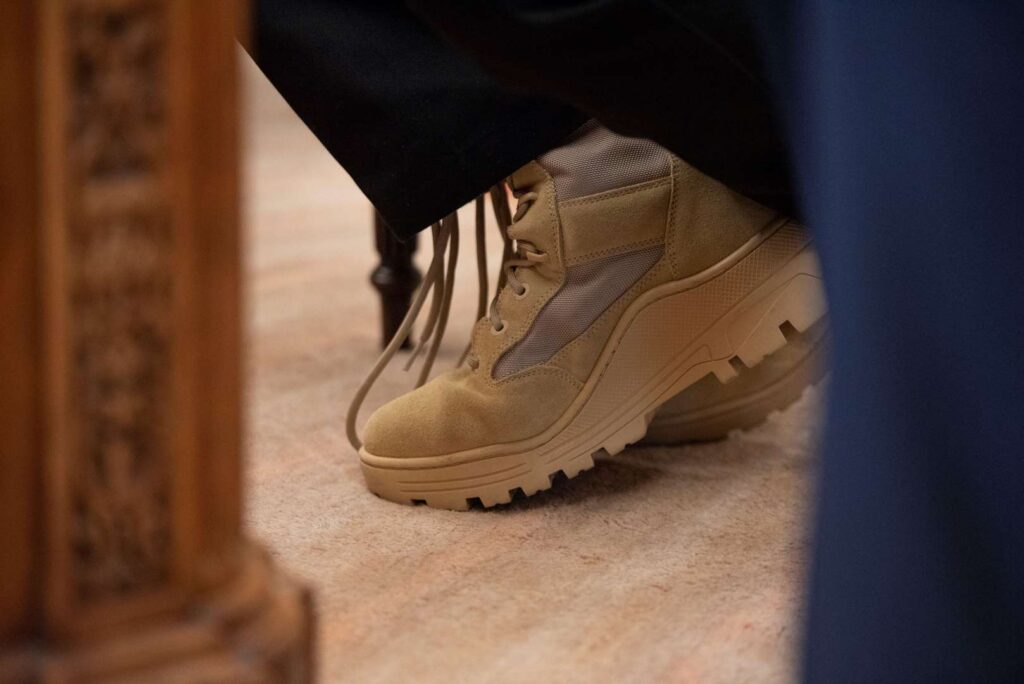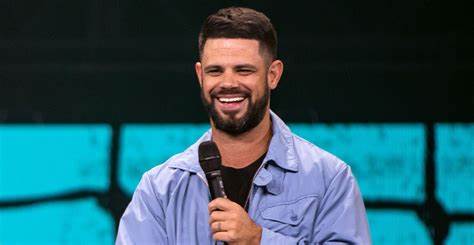
PREACHERS AND THEIR $5,000 SNEAKERS: WHY ONE MAN STARTED AN INSTAGRAM ACCOUNT SHOWING CHURCHES’ WEALTH

From his couch in Dallas, Ben Kirby began asking questions about the lifestyles of the rich and famous pastors when he was watching some worship songs on YouTube on a Sunday morning in 2019. While listening to a song by Elevation Worship, a megachurch based in Charlotte, the evangelical churchgoer noticed the lead singer’s Yeezy sneakers were worth nearly the amount of his first rent check.

Kirby posted to his 400 followers on Instagram, “Hey Elevation Worship, how much you paying your musicians that they can afford $800 kicks? Let me get on the payroll!”
Plus, Kirby wondered, how could the church’s pastor, Steven Furtick, one of the most popular preachers in the country, afford a new designer outfit nearly every week?
With a friend’s encouragement, Kirby started a new Instagram account @PreachersNSneakers posting screenshots of pastors next to price tags and the street value of shoes they were wearing. Within a month, the account had attracted 100,000 followers.
“At the beginning, it was easy for me to make jokes about it,” he said. “Some of the outfits are absurd, so it’s easy to laugh at some of the designer pieces. The price tags are outlandish.”
On his feed, Kirby has showcased Seattle pastor Judah Smith’s $3,600 Gucci jacket, Dallas pastor T.D. Jakes’s $1,250 Louboutin fanny pack and Miami pastor Guillermo Maldonado’s $2,541 Ricci crocodile belt. And he considers Paula White, former president Donald Trump’s most trusted pastoral adviser who is often photographed in designer items, a PreachersNSneakers “content goldmine,” posting a photo of her wearing $785 Stella McCartney sneakers.
As the Instagram account grew, Kirby started asking more serious questions about wealth, class and consumerism, including whether it’s appropriate to generate massive revenue from selling the gospel of Jesus.
“I began asking, how much is too much?” Kirby said. “Is it okay to get rich off of preaching about Jesus? Is it okay to be making twice as much as the median income of your congregation?”
The Washington Post tried to contact several pastors featured on the Instagram account for comment, including Carl Lentz, White and Jakes, but none of them replied.
For the past two years, Kirby has posted and podcasted without sharing his real name, but recently he decided to share his real identity with The Post with the release of his new book, “PreachersNsneakers: Authenticity in an Age of For-Profit Faith and (Wannabe) Celebrities.”
Kirby, 31, who grew up in a Christian home schooling family in Ruston, La., holds a degree in marketing management and an MBA. He attends a nondenominational church and considers himself an evangelical, he said, “not as in, ‘Trump is the chosen one,’ but I believe in sharing my faith.”
When Kirby began showcasing pastors’ high fashion, he was putting dollar signs on designer items for everyone to see just how expensive the clothing items were valued, said Whitney Bauck, a journalist who writes about ethically sourced fashion and first wrote about the Instagram account.
“He is someone who gets Christianity enough and gets fashion enough, but also has a really critical eye,” Bauck said. “He’s not a known professional in either space, so he was willing to say things that people in those spaces weren’t.”
Kirby’s father is a family-practice doctor, so he grew up in what he describes as a “comfortable but modest lifestyle,” where his parents gave generously to their church. He remembers feeling confused when he saw his “Pastor Charles” driving a royal blue Harley Davidson cruiser, worth more than one year of his parent’s tithes. That’s when, he said, he realized that there was a “somewhat fuzzy line” between successful ministry and booming business.
In his new book, Kirby highlights a nationwide trend of pastors wearing oversize glasses, tight jeans and pricey kicks who look like they belong at “your local craft-cocktail watering hole instead of church.”
“Gone are the days of a choir, suited up pastor and random people sitting in velvet chairs onstage. No,” Kirby writes. “Now it’s a U2 incarnate worship band, perfectly placed LED wash lights and a pastor … motivating, edgy and might even let a cuss word slip if you’re lucky.”
From suits to denim, many pastors of all kinds of denominations have shifted in their dress in recent years. The Rev. Melech Thomas, who was born in Baltimore and now pastors an AME church near Raleigh, N.C. said he started attending a Black church in the 1990s, when all the pastors wore black suits. He watched as a generation of young Black male youth pastors began trying to reach a hip-hop generation by wearing jeans and Jordans.
“First it was a theological statement,” Thomas said. “Now it’s a statement of status.”
Thomas, who has been a minister in places with lower-income populations, said he buys most of his clothes from places that set an example to his followers that they don’t have to go into debt to impress people.
“They’re making deliberate choices with the DaVinci, the Prada,” Thomas said. “It seems like they’re choosing to do ministry to people who can afford shoes like that.”
In his book, Kirby writes that these pastors who have enormous social media followings aren’t simply pastors anymore, he writes. Often they are motivational speakers, corporate coaches and leadership consultants. Kirby said he has heard of churches where a volunteer was designated solely for the purpose of carrying the pastor’s Bible. Often, he writes, these pastors have private entrances, reserved parking spaces, security details and a gaggle of personal assistants or handlers. And, often, they promise blessings from God to their followers if their followers bless the church.
“Like Hollywood — a world so often criticized by the pietistic — these institutions and their leaders celebrate and reward the ‘blessing’ of fame, popularity and influence,” he writes. “Pastors function like ‘talent’ performing for an audience or like a spokesman for the church’s ‘brand.’ ”
In recent years, the line between who is a pastor and who is a celebrity has been blurred. Kirby notes how often Hollywood celebrities and preacher celebrities will be seen together in social media posts, such as Lentz playing basketball with Drake, pastor Rich Wilkerson Jr. FaceTimeing with Justin Bieber or pastor Craig Groeschel hanging out with Kanye West at his ranch in Wyoming.
Tim Gloege, a historian who wrote a book called “Guaranteed Pure” about marketing in evangelicalism, said fashion has always been important in religion. In Catholicism, dress was once simple and drawing on ancient Roman dress before liturgical dress became quite regal. The dress was so elaborate that it was the theme of the 2018 Met Gala.High church meets high fashion: How Catholic style took over the Met
During the Protestant Reformation, Gloege said, clergy dress became more academic during a movement toward simplicity.
But in the early 20th century, an evangelist named D.L. Moody made a big splash by dressing in business attire instead of clerical dress. Moody’s business attire made a class statement by associating himself with the respected leaders of his day, according to Gloege, and other pastors began to follow his example.
“Dress often reflects who people currently admire, and how you generate authority in society,” he said. “Do you trust the Koch brothers or George Clooney?”
The U.S. Bureau of Labor Statistics estimates the median salary for clergy was $53,180 in 2019, but Kirby’s Instagram feed showcases how a nationwide evangelical market has become lucrative for leaders with celebrity status. Like other social media influencers, sometimes these pastors are gifted the shoes and clothes they wear.
Kirby notes how the fancy-sneaker-wearing preacher trend has taken off while the resale market for sneakers has also boomed. In 2019, Kirby posted a picture of Pastor John Gray wearing the coveted Nike Air Yeezy 2 Red Octobers, selling at the time on the resale market for more than $5,600. If a pastor buys or receives a new pair of shoes as a gift with a lucrative resale value and chooses to wear them, it can demonstrate to followers that he can afford to not resell them.
Across the United States, the biggest-name pastors and worship leaders produce best-selling books and albums, often earning huge salaries and housing allowances from their churches. And many of the biggest churches, which do not have to disclose their revenue publicly, often generate opulent untaxed revenue.
In recent years, West has helped to bring merchandise into churches with his creation of “Sunday Service,” eventually selling $50 socks that said “Jesus Walks” and $225 crewneck sweatshirts with “Holy Spirit” on the front. Many megachurches began follow, developing their own merch with streetwear elements.
Since starting the Instagram account, Kirby has been dipping his own toes into the evangelical marketplace, entering a world that he has so openly critiqued. Like church leaders, his income is partially dependent on his podcast advertising and book sales, and he sells merch based off the brand. The difference, he said in a later clarification, is that he doesn’t leverage his position as a congregation’s spiritual leader, asking people to donate to a ministry that builds his personal brand.
He has had his own brushes with fame, texting with people such as once-major megachurch preacher Lentz, befriending Joel McHale of the TV show “Community” and attending a Super Bowl party thrown by NBA star Carmelo Anthony.
Kirby doesn’t want Christians to abandon fashion or celebrities, but he does want more transparency and accountability.
“I’m getting people to question the status quo within the church and hopefully push for a reevaluation of what we value,” he said. “People aren’t going to reach God without this guy wearing Yeezys? Come on.”
This story has been updated to correct the spellings of Ruston, La. and Joel McHale’s name. An early version of Kirby’s book suggested that Kirby had been to churches where a volunteer was designated for carrying a pastor’s Bible. He later clarified that he has heard of those churches.